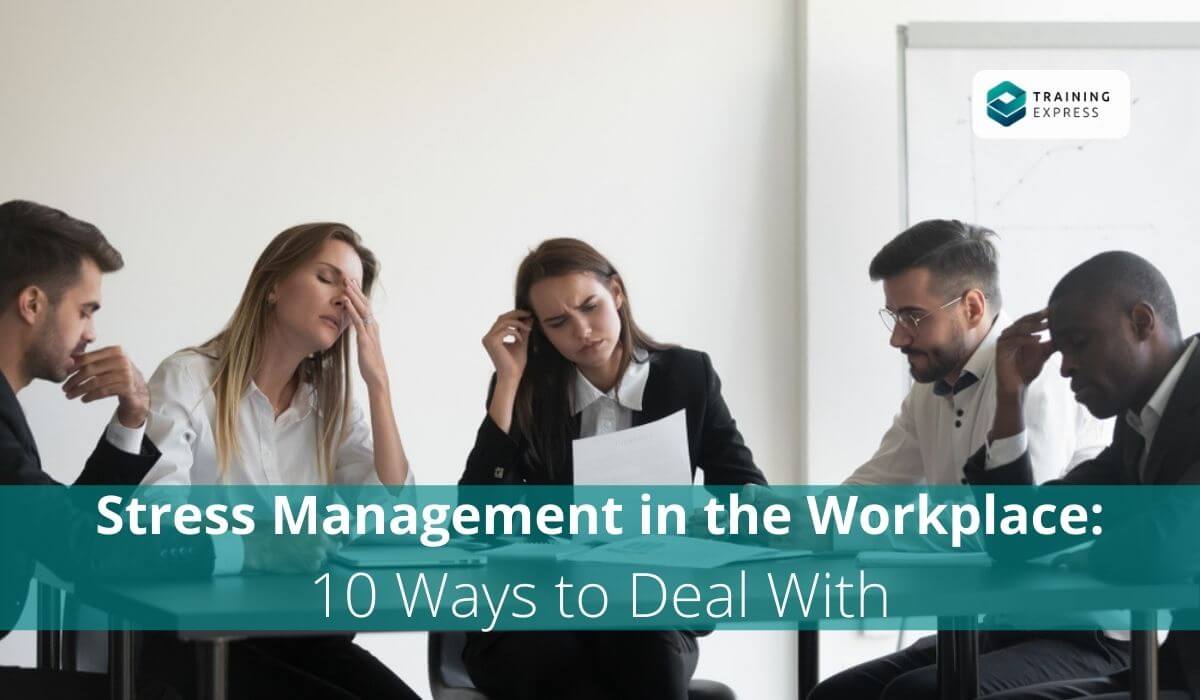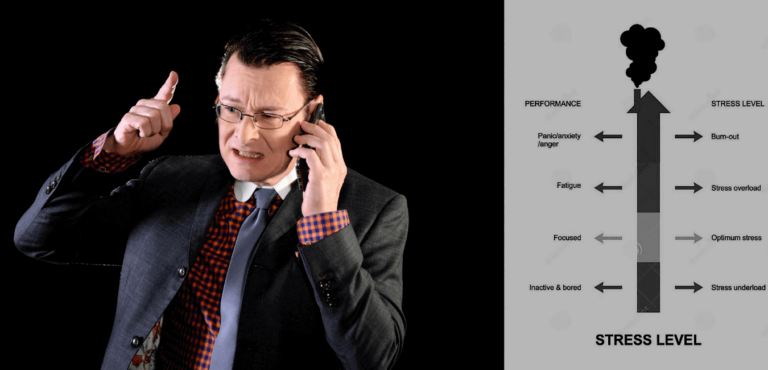

Sometimes we feel overwhelmed when we believe the demand of the situation is more significant than our ability. In other words, we feel stressed. Stress is more common than you might think. In 2020, a study by perkbox found that almost 80% of British adults in employment experience work-related stress. Hence, stress management in the workplace is very crucial.
Table of Contents
Is Stress Good or Bad?

Stress is a response to actual or perceived threats by the body. Today, a fight or flight approach cannot fix all of our challenges. We need to solve our difficulties and find positive solutions.
When someone is relaxed when presenting in a public setting, it’s as if he doesn’t care about delivering a talk. In contrast, someone who doesn’t have confidence in their abilities may be stressed about an upcoming presentation. Long-term life decisions may also be overwhelming, such as a major change in career or parenthood.
Some amount of stress in our lives can be a positive factor. In reality, it is also what gives us the energy and inspiration both at home and office to face our everyday challenges. This stress reaction encourages you to take on the pressure and achieve your objectives such as deadlines, sales quota, development goals or acquire any potential customers. Some people would not think of this challenge as a kind of burden because we are fulfilled and comfortable, having reached this challenge.
Negative stress tends to increase as individuals think that a situation’s demands are higher than their capacity to address it. It will not be effective if stress is avoided. In some cases, people completely stop coping with an issue, making it harder for making them and those around them even more stressed.
Some can find it challenging to focus, make life choices and feel positive while under great stress. Some may have symptoms such as physical sensations, sweating, a pounding pulse or strained muscles.
What are the Symptoms of Work-Related Stress?
Work-related stress may manifest as physical, psychological, or behavioural symptoms.
Psychological Symptoms
Psychological symptoms of stress may include the following –
- Fears
- Depression
- Discouragement
- Irritability
- Being pessimistic
- Feeling exhausted and incapable of confronting
- Intellectual issues, such as impaired focus or decision-making capacity.
Physical Symptoms
Stress can have physical symptoms like the ones mentioned below –
- Tiredness
- Tension of muscles
- Headaches
- Palpitations of the heart
- Sleeping problems, such as insomnia
- Diarrhoea or constipation, gastrointestinal disturbances
- Dermatological disturbances.
Behavioural Symptoms
Stress can be observed in behaviours as well. For example –
- Increased illness or absenteeism
- Aggression
- Reduced creativeness and effort
- A decrease in results
- Interpersonal problems
- Irritability and mood swings
- Anger issues and impatience
- Isolation and disinterest
The Major Causes of Stress in the Workplace
Stress is an unavoidable aspect of our lives in today’s dynamic environment. Every day, we are all nervous for one reason or another.
To monitor or handle it, you need to know the key reasons for tension in the workplace. Don’t skip straight to strategies for stress management in the workplace. First, you need to know some valid reason behind stress in workplace management.

It would be best if you first considered that the tension is regulated or administered in your workplace.
Let’s look at the Major Causes of Stress in the Workplace.
1. Workload
A heavy workload is the most apparent source of work stress. However, there are two phases of this stressor- overload and underload.
a) Overload
The current strategy in the industry is to retain and efficiently utilize limited employees. In such a competitive and fast climate, employees get stressed. High demands and high workload are major sources of occupational stress.
Sadly, the number of workers employed for the workloads is increasing as more businesses attempt to cut financial corners.
b) Under Load
Under load refers to the condition of employees working less with more time. Due to this, employees may begin to doubt their ability and feel overwhelmed in such situations.
2. Lack of Job Security
This is the most significant source of employee stress. Today’s economy is very volatile, competitive. These two causes lead to cost reduction efforts and lay-offs by businesses. As a consequence, the threat of job loss and high expectations create unfair stress for workers.
The employee must demonstrate true potential and power under such circumstances. Retained workers are expected to do overtime work. Also, when the economy is poor, people have no choice but to achieve higher performance than planned. Such high expectations of each individual cause more stress.
3. Unrealistic Expectations
It can trigger high stress when there’s a mismatch between what is possible and what is expected. There is only so much that a worker can do, and it’s not good for anyone to keep an unrealistic standard. The worker can be incredibly stressed in this kind of situation. Instead of analysing what timelines or goals need to be adapted, the worker is typically responsible.
4. Conflict
In the office, there are several causes for conflict. Conflict usually occurs because of the ‘blame game’ of the business. All are scared of retribution in this environment, so nobody can say it when it’s wrong. Instead of learning about their failures, employees accuse each other. This creates animosity and adds to an ambience of toxicity.
5. Limited Training and Resources
When a person is not qualified and eligible for the responsibilities, it isn’t easy to meet the employment needs. On the other hand, if the staff are qualified and ready for the job, they can carry out the mission and comply with the standards of efficiency and time.
But if an employee works in a position that does not balance the job requirements with his skills. Then the pressures might be stressful from time to time. Besides, there is a risk of losing their job if an employee cannot work up to the standards.
6. Poor Management Style
Having a manager or superior with a poor management style can make the workplace very stressful. Rude, manipulative, inconsiderate managers can make your work experience unpleasant. On the other hand, a good management style can help you improve your abilities, be more productive and help reduce your stress levels a lot.
7. Change in Organizational Setting
Sometimes organizations need to change to adapt to their industry or to innovate and improve. A corporate transition may have a significant impact on workers. During such changes, not everyone feels encouraged and relaxed. While some staff members welcome this, others may find it overwhelming.
Changes in the organization strategy, processes, teams, workplace setting, cultural, or work climate all cause fear and stress for employees if they’re not correctly handled.
How to Monitor Stress Management in the Workplace?

It is up to the employers to ensure the employees’ health and safety at work. Managers should be proactive in this regard. They should be concerned about distress in the workplace since it can significantly impact their bottom line.
Employers should look at the following to get an idea about how their employees are coping with stress
- Change in routine behaviour of workers – such as irritable, withdrawn or unpredictable behaviour.
- Unable or unwilling to engage with others.
- Failure to concentrate on work.
- Absenteeism.
Increases the likelihood of actions to address symptoms and root triggers through identifying stress signs at an early level, minimizing the danger for people’s well-being, safety and consequences on the department.
10 Strategies for Stress Management in the Workplace

Work stress can have major health effects that vary from relatively mild (like having headaches) to something potentially dangerous (such as heart disease and metabolic syndrome).
Though some degree of work stress is normal, it is difficult to find a low-stress job (if not impossible). A successful strategy to stress management in the workplace is a more practical solution. You can try any stress management strategies if you find it challenging to deal with stress.
Here is a list of 10 possible ways to proceed. You may choose one or two things that make the most sense to you and make them part of your everyday life to help you create healthier routines and support your mind.
1. Find Time for Yourself
You need to find time for yourself. Schedule a meeting with yourself! Close the office door and reflect on measurable results on your objectives (or maybe slip on your headphones if that’s okay).
Set a specific time for yourself. Do not let people plan you at this time for meetings. Having some time to reflect on your daily activities can have a positive impact on your stress.
2. Set Your Priorities Straight
When you have a long list of to-do’s, it’s easy to feel exhausted. Calm yourself and write down a list of things to do according to their importance. This will contribute to increasing productivity and reducing unwarranted tension.
3. Keep Yourself Organized
Your job stress will decrease in a short period if you choose to stay organized. Organizing your time means making less effort in the morning to keep you out late and less hustle at the end of the day.
Being organized can give you a sense of being in control and bring you peace, thus effectively reducing your stress.
4. Accept the Faults in Every Person
People don’t know everything, and the boss is not always right. And expecting them to be perfect is irrational. People’s imperfections may not help your stress level though. It can put you in a state of disappointment or anguish when expectations don’t match up.
Remember that managers are probably just as stressed.
5. Spend time with family and friends
Stress can also lead to anxiety and depression, which can lead to social situations becoming withdrawn. Make some time for friends, families and guests. This will contribute to improve mood and help you manage stress.
6. Consider Alternative Work Scheduling
When one of the staff has an infant or an elderly adult in need, the pressures of work and home can be exhausting. Allowing workers flexibility gives them time to take care of others and encourages them to be more active when at work.
If an employee wants to work from home or needs a day off, take it into consideration. An alternative work schedule may give them a sense of change. It can also have an impact on their stress levels.
7. Free Yourself from Self-imposed Stress
Sometimes we create unnecessary stress by overthinking, self-doubt or insecurity. Shift your attention from others and do your job as efficiently as possible.
8. Identify What Causes You Stress
You can better relieve the depression by knowing the stressors. Identification of problems that trigger stress in your life will help you escape unpleasant circumstances. It’ll help you to learn to deal with stressful situations that cannot be avoided.
9. Practice Tactics for Minimizing Stress
You can relieve stress by a variety of strategies. Try exercises that can help you relax, including yoga, deep breathing or meditation.
10. Contact the Physician
If stress is becoming difficult to manage and impairs your day-to-day life, please contact your healthcare provider. Your primary health care provider can assist you with any health or medical requirements.
How To Create A Stress-Free Work Environment?
A stress-free work environment is very important for maintaining continuous productivity. For creating an employee-friendly work environment, stress management in the workplace is a must. Let’s discuss some strategies for a positive work environment.
1. Keep Personal Favourite Things Nearby
If your workspace stresses you, it will help incorporate personal things that have particular significance for you at your desk or cubicle. It may be portraits, inspirational works, novels, a certain lighting or decorative accessory etc.
2. Keep Your Workspace Clean and Organized
It may be difficult for many people to concentrate when their desks are full of documents, telephone calls, business cards, magazines and newsletters. It’s the same for thousands of unorganized emails in the inbox. So keep your workspace organized for a productive and stress-free life.
3. Adapt to Changes
Should you worry about changing? You’ve got to learn to adjust fast in today’s competitive environment. It can be a change due to new technologies and applications (printers, computers), a makeover or some drastic life-changing decisions. Accept that changes are a part of life.
4. Redecorate
You may not be aware of the stress caused by factors such as lighting, colours and decoration, but they are pretty likely. If possible, try to change the colour of the wall in your office. For instance, neutral tones can be soothing.
Replace fluorescent lights with softer, more environmentally friendly lighting. Invest in an ergonomically suitable desk and flash displays for a good chair.
5. Be an Excellent Communicator
Poor communication in the workplace often leads to misunderstanding and thus causes stress. Be open to communication. Effective communication can go a long way in making the workplace stress-free. For this, you can arrange different FAQ session or quiz competition etc.
Closing Notes
Do you know that stress is the most significant cause of health and disease at work in the UK? In the UK and all over the world, workplace stress is now becoming an increasing problem. To overcome these stress-related problems, you may take courses like Diploma in Stress and Anger Management and Stress Management.
- Available Courses
- Career Bundles72
- Animal care5
- Law8
- Quality Licence Scheme Endorsed111
- Teaching13
- Teaching & Academics Primary27
- Accounting & Finance Primary29
- Training3
- Design9
- IT & Software43
- Healthcare124
- Marketing31
- Health and Safety400
- Construction48
- Electronics25
- Hospitality22
- Health and Social Care219
- Child Psychology37
- Management370
- Business Skills267
- First Aid70
- Employability264
- Safeguarding75
- Food Hygiene103
- Personal Development1272
 Food Hygiene
Food Hygiene Health & Safety
Health & Safety Safeguarding
Safeguarding First Aid
First Aid Business Skills
Business Skills Personal Development
Personal Development












